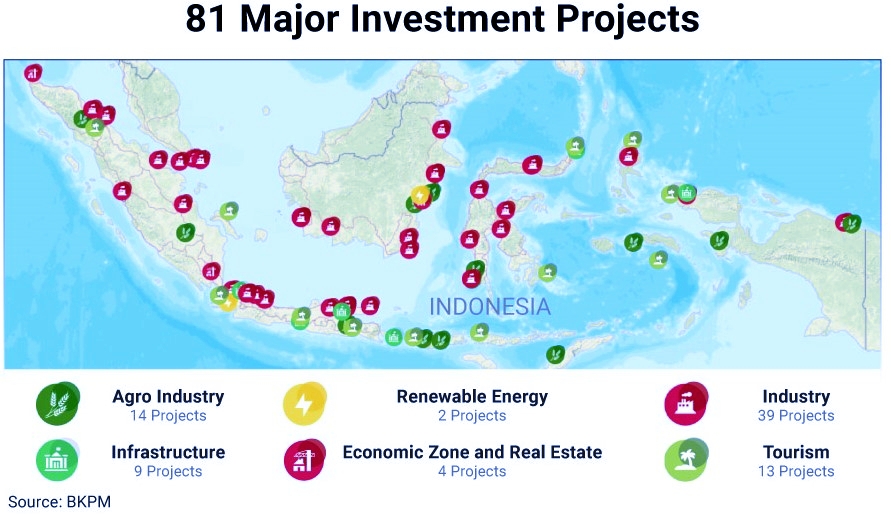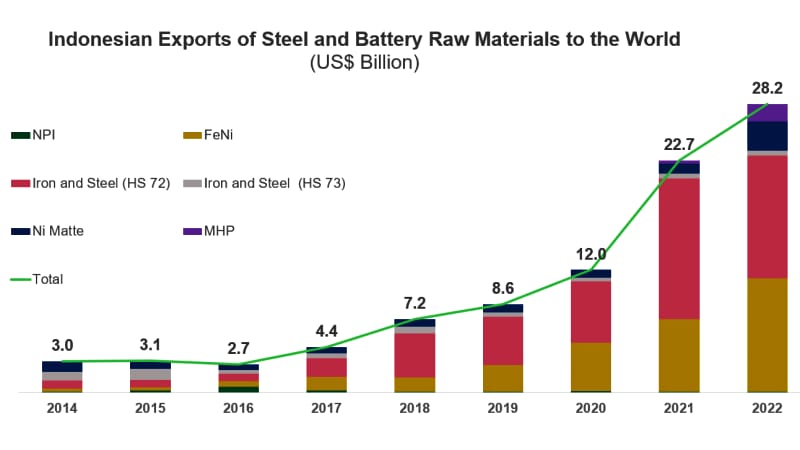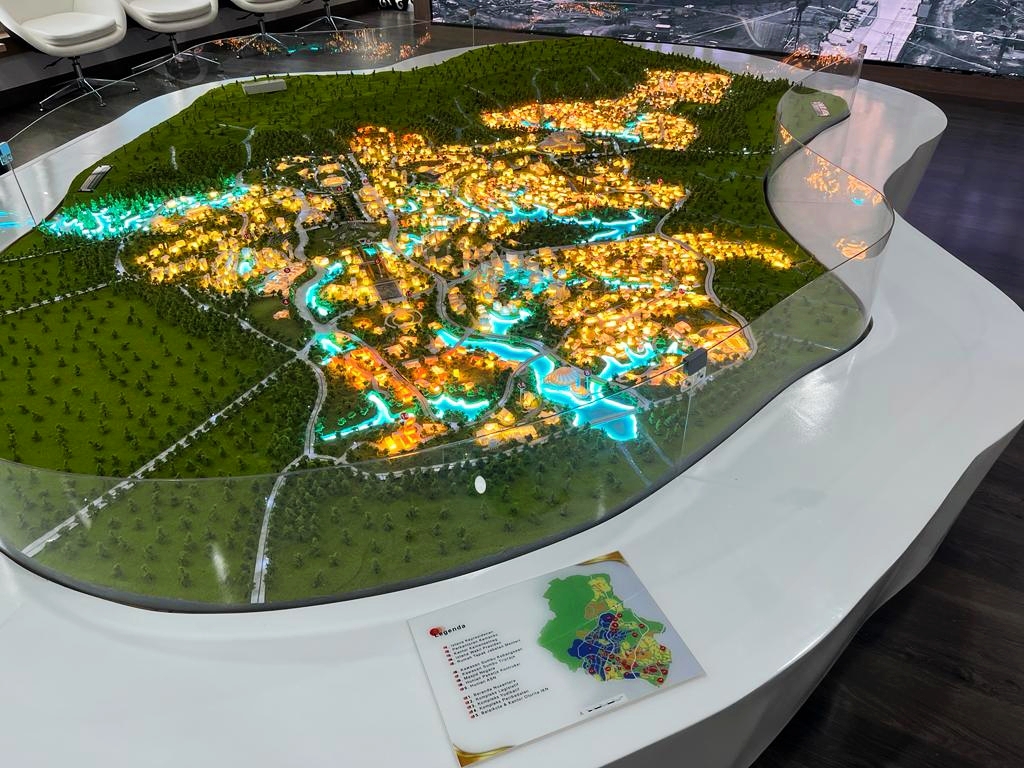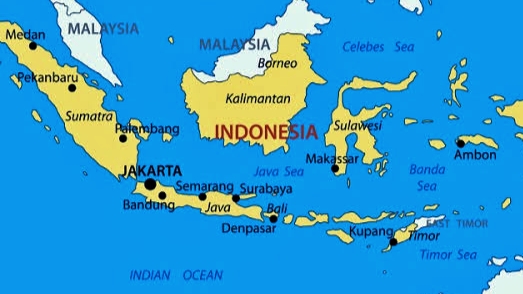NATIONAL, 20th APRIL, 2024 (GPN): Rising labour costs, geopolitical tensions and a growing demand for supply chain resilience are increasingly prompting manufacturers to look for alternative production bases in addition to their well‑established supply chain networks across the Chinese mainland. With manufacturing industries looking for new production alternatives and consumer markets, ASEAN’s large population, vibrant economy, strategically important location and regional connectivity are fast making the region a favoured destination for recalibrating supply chains, and relocation and investment in general.
Indonesia is the most heavily populated of the ten ASEAN member states, with a population of nearly 280 million. It is ASEAN’s largest economy and its second largest recipient of foreign direct investment (FDI), after only Singapore. In 2022, the country attracted over US$43 bn (HK$336.2 bn) in FDI inflows. Of this amount, Hong Kong contributed US$5.5 bn – making it the third largest source of FDI in Indonesia, behind only Singapore (US$13.3 bn) and mainland China (US$8.2 bn).
Notably, according to Indonesia’s Ministry of Investment, also known as BKPM, the accumulated investment from Hong Kong reached US$18.5 bn in the five years ending 2022, with the number of projects exceeding 8,400. With an average investment of US$2.2 mn per project, Hong Kong’s investments in Indonesia have actually been made over a diverse range of small to medium‑sized projects, rather than a small number of big‑ticket projects.
| Indonesia’s Major Foreign Investment Sources | ||||||||
| 2020 | 2021 | 2022 | ||||||
| Rank | Country/Region | Investment (US$ mn) | Country/Region | Investment (US$ mn) | Country/Region | Investment (US$ mn) | ||
| 1 | Singapore | 9,779 | Singapore | 9,390 | Singapore | 13,281 | ||
| 2 | China | 4,842 | Hong Kong | 4,609 | China | 8,226 | ||
| 3 | Hong Kong | 3,535 | China | 3,160 | Hong Kong | 5,514 | ||
| 4 | Japan | 2,588 | USA | 2,537 | Japan | 3,565 | ||
| 5 | South Korea | 1,841 | Japan | 2,263 | Malaysia | 3,343 | ||
Source: BKPM
Golden Indonesia 2045 Vision
In 2019, Indonesian President Joko Widodo launched the Golden Indonesia 2045 Vision, which set out a roadmap for how the country could become a high‑income country with a per capita income of more than US$23,000 (HK$180,000) by 2045. By then, Indonesia’s population is projected to reach 324 million, making it the fourth or fifth largest market in the world. Among the goals of the 2045 Vision are alleviating poverty, improving the country’s global impact, enhancing competitiveness and promoting sustainable livelihoods.
Investment is expected to play a crucial role in achieving the 2045 Vision, both by creating jobs and by raising the nation’s value chain. BKPM has identified more than 80 key investment projects across six sectors – agro‑industry (such as layer farming, chili paste and seafood processing), industry, infrastructure, renewable energy, economic zones and real estate, and tourism. These projects have already attracted IDR239 tn (HK$120 bn) worth of investment so far. 70% of that total has gone to the industry sector, while infrastructure accounts for 20%.
Indonesia is rich in palm oil and mineral resources such as coal, nickel and copper. It has the world’s largest nickel reserves (estimated at 22 million tons, some 22% of the global total). This has prompted the country to place a high priority on attracting value‑adding downstream industries which can make the best use of its natural resources. In 2022, the mining and quarrying sector made up 12.2% of the nation’s GDP. In order to develop the downstream industry, it is estimated that investment of over US$430 bn is needed from now until 2040. The country’s abundant natural resources and high level of commodity exports mean there are ample opportunities for it to develop its downstream industries and as a result improve its foreign exchange earning ability.
Alongside key industrial segments like pharmaceuticals, textiles, leather and footwear, Indonesia is also committed to developing its electric vehicle (EV) supply chains, using its mineral resources, especially nickel, to tap into the growing global popularity of EVs. The country aims to become one of the top three producers of EV batteries by 2027. The country has already, since 2020, banned the export of nickel ore – a crucial input for EV batteries – in order to nurture the development of domestic smelters, support domestic production and boost the export of value‑added nickel products.
According to an Investment Report, Indonesia is the only ASEAN member state with a full EV value chain, from nickel mining and smelting to EV battery production and EV assembly.
| Mineral | Reserves | Production | ||
| Rank | Global Share (%) | Rank | Global Share (%) | |
| Nickel | 1 | 22 | 1 | 36 |
| Tin | 2 | 17 | 2 | 23 |
| Bauxite | 6 | 4 | 6 | 4 |
| Gold | 6 | 4 | 10 | 3 |
| Copper | 10 | 3 | 9 | 4 |
Source: BKPM
In order to promote the adoption of EVs and encourage the transition from traditional motor vehicles, Indonesia has pledged to increase the number of EV charging stations to over 20,000 by 2025. The country is also offering tax incentives, including import duty and luxury goods tax exemptions, to attract FDI into the EV industry. Early examples of the success of this policy include the plan by China’s BYD, the world’s largest EV producer, to invest US$1.3 bn in the construction of an EV plant in Indonesia. The plant will be the company’s sixth overseas factory.
Infrastructure has been another focal point for the economic programme drawn up by President Widodo’s administration. Numerous ports, airports and highway projects have been completed in the past decade, including the landmark Jakarta-Bandung High-Speed Railway (HSR), the first of its kind in Southeast Asia. There is a continual demand for new infrastructure development, as shown by the ongoing new capital city project, Nusantara.
It’s projected that, in the five years to the end of 2024, the country will need over US$400 bn in infrastructure investment. To bridge that funding gap, Indonesia welcomes private involvement in infrastructure development through various private‑public partnership (PPP) initiatives. This should create plenty of opportunities for Hong Kong investors and professional services providers.

Tourism in Indonesia
Tourism in Indonesia is a significant part of Indonesia’s economy. The country was named the world’s “Most Beautiful Country” by Forbes in 2022, and it attaches high importance to developing an integrated tourism infrastructure and a skilled workforce which can support sustainable‑based tourism projects. In order to encourage this, the Ministry of Tourism and Creative Economy has fully liberalised the sector for foreign investment.
 Central Java is widely recognised as an attractive destination for FDI, primarily because of its relatively low minimum wage (around IDR2 mn, or HK$1,000, per month). Its proximity to economic powerhouses like Jakarta and Surabaya, which are just a one‑hour flight away, also makes it popular for export‑led manufacturing investment.
Central Java is widely recognised as an attractive destination for FDI, primarily because of its relatively low minimum wage (around IDR2 mn, or HK$1,000, per month). Its proximity to economic powerhouses like Jakarta and Surabaya, which are just a one‑hour flight away, also makes it popular for export‑led manufacturing investment.
The province has a relatively large agriculture sector, accounting for 11% of its GDP. As a result, agro‑industry dominates Central Java’s manufacturing sector. Other leading sectors include tourism and industry.
Central Java is making significant progress in integrating itself into the EV supply chain. For example, an EV battery production facility is under construction in the Batang Industrial Estate, which, when completed, will be the world’s first such facility integrating the upstream and downstream elements of EV production, including nickel mining, smelting, precursor making, cathode manufacturing, electric battery production, battery pack production, EV production and battery recycling. Negotiations are currently underway with
South Korea’s LG Energy Solution to build an EV battery cathode plant in Batang, which would involve investment worth US$600‑800 mn.
The Kendal Industrial Park is currently the only Special Economic Zone (SEZ) in Central Java. It obtained SEZ status in 2019, and offers fiscal benefits including tax holidays of up to 20 years for industries like furniture and toys, electronics, food and beverage, logistics and packaging, the automotive industry and fashion. VAT exemptions are also available for the purchase of land, raw materials and equipment.
Sulawesi, in the northeast of Java, is currently the most popular investment destination in Indonesia with Hong Kong investors. BKPM has identified 12 key investment projects in Sulawesi which have attracted over HK$64 bn of realised FDI. Central and Southeast Sulawesi, the provinces with the highest concentration of realised FDI from Hong Kong, are rich in minerals like nickel, with the mining sector accounting for 17% of Central Sulawesu’s GDP in 2021 and 20% of Southeast Sulawesi’s.
The agriculture and fisheries industry is another of the two provinces’ economic pillars. In 2021, it contributed 20% to Central Sulawesi’s GDP and 22% to that of the Southeast.
The increase in Indonesia’s middle class has seen a significant rise in the domestic consumption of fresh seafood, while the country’s exports of fresh seafood are highly sought after thanks to improvements in global logistics systems. There is a good opportunity for investors, including those from Hong Kong, to facilitate the export of Indonesian seafood to the Middle East, for example, through advanced cold chain logistics.[2]
Additionally, aquatic commodities have increasingly been processed into health supplements such as fish oil and collagen to meet the heightened global demand from increasingly health‑conscious consumers in the aftermath of the Covid-19 pandemic.
More favourable investment regime
In order to attract FDI, create jobs and stimulate the economy, Indonesia introduced the Job Creation Law in November 2020. Following legal challenges, a new law was passed in March 2023 to replace the 2020 version.
The new law incorporates pro‑business regulations aimed at improving the ease of doing business in Indonesia. It simplifies licensing and land acquisition processes, and reduces bureaucracy in general. Under the new law, 79 laws on 11 sectors have been
consolidated into a single framework.
In order to streamline the business registration process, the BKPM has been given the authority to issue business licences, a task previously undertaken by over 20 different investment authorities. This allows businesses categorised as “low risk” to make hassle‑free applications for licences through BKPM’s Online Single Submission system.
Other investment liberalisation measures include:
100% foreign ownership: 100% foreign ownership is now allowed in all business fields for both FDI and domestic direct investment (DDI), except for those stipulated in Presidential Regulation No.49/2021 on Business Fields for Investment.
Low minimum paid-up capital for FDI: The minimum amount of paid‑up capital needed for FDI has been set at IDR10 bn (HK$5 mn)
Low corporate income tax (CIT): CIT has been lowered from 25% to 22%. Listed companies on the Indonesia Stock Exchange can enjoy an even lower CIT of 19%.
Extra incentives are also offered to businesses and investments.

A model showing the phase 1A of the new Nusantara Capital City
Nusantara – The New Capital City
In 2019, in order to address the issue of overcrowding in the greater Jakarta area, President Widodo announced plans to establish a new capital city in East Kalimantan. The new city is about 1,236 km from Jakarta. The commuting time between the new and old capitals is estimated to be around three hours, involving a two‑hour flight and either a 90‑minute car ride or 40‑minute boat trip.
The aims of the new city include fostering human development and technological advancement, promoting equitable and sustainable economic growth, and enforcing good governance with a zero‑tolerance policy towards corruption. It is expected to provide a significant boost to East Kalimantan’s GDP, increasing it threefold by 2045, while also catalysing the development of neighbouring parts of eastern Indonesia.
Nusantara is positioning itself as a Sustainable Forest City, with a strong commitment to preserving and conserving biodiversity. It’s also aiming to become Indonesia’s first carbon‑neutral city, relying wholly on renewable energy by 2045. To minimise the impact on the forest and mangroves, a new underground toll road is under construction to connect Balikpapan (the closest airport) and the city’s central business district.
The development is planned to take place in five phases, with a target completion date of 2045, coinciding with the centenary of Indonesia’s independence. Once the city is fully functioning, some 1.9 million people are expected to live there.
The initial stage, or phase 1A, is set to begin in August 2024 along with the celebrations of Indonesia’s national day.
As a mega investment project in itself, the new capital city offers foreign investors a wide range of opportunities spanning multiple sectors, including renewable energy, transportation, housing, water treatment and waste management, telecommunication infrastructure, education and research facilities, medical facilities and commercial and industrial areas.
Potential investors must submit a letter of intent to the Nusantara Capital Authority. There are currently 300 investment packages available in the new capital city project, primarily focusing on housing, commercial buildings and the construction of schools, hospitals and roads.
To date, the Nusantara Capital Authority has received 293 letters of intent from companies from 19 countries, nearly half of them from foreign entities.Ends/GPN


Be the first to comment on "Indonesia: A Preferred Investment Destination and Supply Chain Partner!"